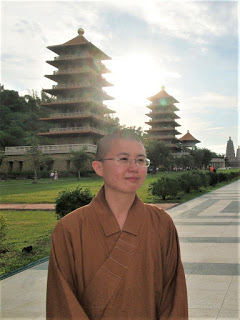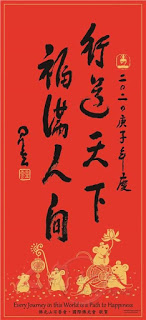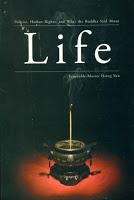
Speaker: Venerable You Lu
Fo Guang Shan Buddha Museum
I. Introduction
Hi everyone, good evening. My name is You Lu and I am currently serving at the Fo Guang Shan Buddha Museum. Thank you for tuning in to the English Dharma Services. Allow me to give thanks as well to Venerable Miao Guang and her team for giving me this opportunity to share my thoughts with you tonight.
Today I would like to share two stories on mouse. As we know, this year is the Year of the Rat in the Chinese lunar calendar, and the coronavirus outbreak started at the beginning of this lunar year. The first story is a Chinese folklore narrating why the mouse was picked as the foremost animal in the twelve Chinese horoscopes.
II. How the Mouse Came First

A long long time ago, cats and mice used to be good friends. They ate together, played together, and they lived together happily. One day, the Emperor of China thought that it would be a good idea if he named each of the twelve years in the Chinese calendar after an animal. He decided that there should be a race among all the animals, and the first twelve animals to cross the finish line would receive this honor. But it will not be an easy race, because they must run through the forest and swim across the river. Both the Cat and the Mouse wanted to win the race but they knew that would be hard because they are smaller than the other animals, and crossing that river is a problem.
They decided to ask the water buffalo for help since he always wakes up before sunrise, before anybody else did. With luck, they might even be able to ride on his back. So they did, and the kind Buffalo took them on his back and took them across the river early in the morning of the race.
From afar, the Mouse saw the Emperor at the finish line, and he wanted to cross this line first. So the clever Mouse thought of a plan.
“Look at all the tasty fish swimming in the water!” he told the Cat. The fish looked irresistible. As the Cat leaned over for a closer look, the Mouse gave him a little push, and the Cat fell into the river.
The Buffalo turned around to see what made the splash, but he saw other animals following closely behind him. With no time to waste, the Buffalo sped toward the Emperor. Just as they were close to the finish line, the clever Mouse jumped from the Buffalo’s head and crossed the line in the first place.
So the small but smart Mouse won the race and the hardworking Buffalo won the second place. The Tiger took the third place and Rabbit dashed across the finish line taking the fourth place, just before the Dragon came from the sky, who took the fifth place. The Snake was sixth and the Horse, seventh. The Goat came eighth and the Monkey was behind him. After a little while, the Rooster finally made across the river taking the tenth place. The Dog was number eleven because he was having too much fun in the water.

The Cat was huffing and puffing and the finish line was just right ahead of him. But before he made it to the finish line, the Pig overtook the Cat and rushed across the finish line. By the time the Cat arrived at the finish line, it was all worn out.
“How did I do?,” the Cat ask the Emperor.
“I’m sorry, Cat, but all twelve places are already filled. You are a little too late,” replied the Emperor. So from that day, cats and mice became enemies.
In the story, the mouse is the smallest, yet it is the smartest among the animals. This illustrates why we should never underestimate or look down upon the small. The coronavirus outbreak is also an important lesson about why we should not underestimate any small cause. The coronavirus is so small that it is invisible to the naked eye, yet it is able to bring about a pandemic, affecting the lives of almost everyone in the world.
There is a saying that “the devil is in the details.” Steve Jobs once said that, “Details matter. It’s worth waiting to get it right.” Many entrepreneurs have said that the secret to success lies in paying attention to details. In the book titled From Stagnation to Vibrant Living by Amrit Bansal, he wrote, “The secret behind every outstanding achievement lies in paying attention to detail. If you want to achieve great success, try to do little tasks with total honesty and involvement. Even big projects depend upon the success of small steps that go into making it what it is. Your project is nothing but an accumulation of minor tasks as the ocean is nothing but a big collection of drops of water.”
We find a similar quote in the Dhammapada, in which the Buddha says,
Think not lightly of evil, saying, “It will not come to me.” Drop by drop is the water pot filled. Likewise, the fool, gathering it little by little, fills himself with evil.
Think not lightly of good, saying, “It will not come to me.” Drop by drop is the water pot filled. Likewise, the wise man, gathering it little by little, fills himself with good.
Similarly, there is a Chinese saying, “Do not hold back kindness even if it may be small in scale, and do not commit small acts of unwholesomeness thinking these are negligible.” This illustrates that we should not underestimate or look down upon the strength of the small.
In the Ekottara-Agama, the Buddha stated four things that one should not belittle; they are a prince, a small fire, a dragon, and a novice monk. The Buddha explained, saying a prince may be little but he can grow up to govern. A small fire may not be roaring, but a spark can ignite a plain. A dragon may appear small but can bring rain when the time is right, and a novice monk may be young, but he can become a king of the Dharma to liberate people.
On the above quote, Venerable Master commented, “A small personal misbehavior can cause a person, a society, a country or even the world immense loss and regret. If every person can start doing good deeds by saying a word of praise, smiling at others, having positive thoughts, giving someone a helping hand, and being mindful of protecting the environment, conditions will change and the world can be improved.” (Seeking Happiness p. 35-36)
In the current coronavirus pandemic, we see that a disease of microscopic scale can spark off something so global, which goes to show how inter-connected the world is. Now I will go on to tell you the second story that is related to inter-connectedness. It is called the “mousetrap story”, and the story goes like this:
III. The Mousetrap
Once there was a farmer who lived with his wife. One day, they discovered a mouse in the house, and they decided to get a mousetrap from a local supermarket. When they returned, the mouse in the house looked through the crack in the wall to see the farmer and his wife open a package. What food might this contain? The mouse wondered. He was devastated to discover it was a mousetrap.
Retreating to the farmyard, the mouse went about warning everybody what he saw: “There is a mouse trap in the house! There is a mouse trap in the house!”
The chicken clucked and scratched, raised her head and said, “Mr. Mouse, I can tell this is a grave concern to you, but it is of no consequence to me. I cannot be bothered by it.”
The mouse turned to the pig and told him, “There is a mouse trap in the house! There is a mouse trap in the house!”
The pig sympathized, but said, “I am so very sorry, Mr. Mouse, but there is nothing I can do about it but pray. Be assured you are in my prayers.”
The mouse turned to the cow and said, “There is a mouse trap in the house! There is a mouse trap in the house!”
The cow said, “Wow, Mr. Mouse. I’m sorry for you, but it’s no skin off my nose.”
So, the mouse returned to the house, head down and dejected, to face the farmer’s mouse trap alone. That very night a sound was heard throughout the house – like the sound of a mouse trap catching its prey. The farmer’s wife rushed to see what was caught. In the darkness, she did not see it was a venomous snake whose tail the trap had caught. The snake bit the farmer’s wife. The farmer rushed her to the hospital, and she returned home with a fever.
It was a custom to treat fever with fresh chicken soup, so the farmer took his hatchet to the farmyard for the soup’s main ingredient.
But his wife’s sickness continued, so friends and neighbors came to sit with her around the clock. To feed them, the farmer butchered the pig. The farmer’s wife did not get well; she died.
So many people came for her funeral that the farmer had the cow slaughtered to provide enough meat for all of them.
The mouse looked upon it all from his crack in the wall with great sadness.
In the story, the chicken, the pig, and the cow ignored the mouse’s cries, thinking that the problem belonged only to the mouse. What if the chicken, pig, and cow reacted and responded to the mouse’s cry for help, what do you think might have happened? Things might have been less severe, and maybe the animals would have escaped unnecessary deaths.
This story tells us something: when we are not mindful enough, anything small can snowball into drastic situations. Similarly, when something emerges in one corner of the world, we should not ignore what has happened and pretend that the same situation would not happen to us, because as a matter of fact, we are all very much inter-connected. We share a lot in common, we all rely on the same sun, we breathe in the same air, and we are equally dependent on the same kinds of natural resources.
In Buddha-Dharma: Pure and Simple, Venerable Master Hsing Yun referred to suffering as a form of education, a form of strength, a kind of sustenance, and a type of training. He added that “without the trials of natural disasters, people would not know how to adapt to the changes in the environment. Without man-made calamity, people would not know how to prepare for adversity.” (p.38) Thus, suffering can also be our teacher, because it teaches us to be wiser.
IV. Conclusion
To conclude, these two stories about mouse tell us the following:
First, do not underestimate or look down upon the small. We should be mindful about every small act or deed we make, because if we are reckless, something small like the coronavirus can turn itself into a pandemic and create suffering on a massive scale. Fortunately, over the past two to three months, people have started to cultivate small habits of good hygiene, like washing hands, wearing masks, and acting responsibly by keeping safe distances from one another. People are willing to do that because we know that a small act can go a long way. Not only do we need to cultivate good hygienic habits, we also need to cultivate good moral habits, like protecting lives, speaking truthfully, and rejoicing in the good acts of others.
Venerable Master Hsing Yun has often advocated the three acts of goodness, which are doing good deeds, speaking good words, and thinking good thoughts. These three acts of goodness can go an even longer way.
In the experiment conducted by Professor Masaru Emoto, he discovered that human consciousness has an effect on the molecular structure of water. He showed how water react to thoughts and words. Water exposed to positive speech and thoughts would result in visually “pleasing” crystals being formed when the water froze. Subjecting water to negative intentions, however, yield “ugly” frozen crystal formations. He also showed how polluted water could be cleaned through prayer and positive visualization.

On the 25th of July 1999, 350 people gathered and offered their prayers to Lake Biwa, the largest lake in Shiga prefecture, Japan. Lake Biwa used to be filled with foul smelling and dirty water. Every summer the surface of the lake is covered with putrefying algae. For over twenty years the prefecture has been carrying out a large-scale operation to weed it out. However, after the prayer, the aquatic plant that causes the algae hardly emerged at all, and there were no complaints made to the city office.
We can draw parallel inferences from this study to see that good deeds, speech, and intentions can bring about good physical transformation. Since every small thing we do, every single word we say, and every intention we make can bring about changes to our environment, the three acts of goodness can indeed go a long way.
Secondly, we need to realize that we are all inter-connected, and so it is important for us to act responsibly as a global citizen. In his book titled Life, Venerable Master quoted a famous letter attributed to Chief Seattle, a Native American who was negotiating with the United States government for the sale of his people’s land. The letter reads:
“We are part of the earth and it is part of us. The perfumed flowers are our sisters, the bear, the deer, the great eagle, these are our brothers. The rocky crests, the juices in the meadow, … and man, all belong to the same family … the earth does not belong to man, man belongs to the earth. All things are connected.”
In the book, Venerable Master commented that “Humans beings must not only live peacefully with each other, but be able to peacefully coexist with nature. Some people say that animals are born to be eaten by human beings; this is an extraordinarily mistaken idea.” As a global citizen in this web of interconnectedness, we need to be aware of lives around us, not merely other human beings, but also living creatures, birds, fishes and animals, and the natural world. So instead of taking lives and feeding on lives, we should learn to protect lives. Protecting lives entails not just abstaining from killing lives, but also abstaining from feeding on lives, especially that of wildlife. Because all beings share the common goal of wanting to be happy and be freed from suffering, wouldn’t it be wonderful if we all help one another out in achieving what we have in common?

Although the Year of the Rat did not start off very well for most of us, it serves as a reminder for us to be mindful of every little small act we do, that we should act responsibly knowing that we are all inter-connected to one another. And when that happens, we can be sure that the Year of the Rat would be pivotal in making the world a safer and better place to live in. And like the Chinese New Year message that Venerable Master has written for the Year of the Rat, our Every Journey in this World would be a Path to Happiness.
That’s all I would like to share for my talk tonight. Thank you again for tuning in. If you have not subscribed to this channel, please remember to hit the subscribe button for more Dharma wisdom, and also hit the bell button next to the subscribe button so you will not miss the latest updates.
Thank you everyone, and auspicious blessings to you all!
FGS Publications Mentioned in this Dharma Talk:
Buddha-Dharma: Pure and Simple 1

In today’s Buddhist sphere, numerous claims have been made on what the Buddha has taught. However, were they truly spoken by the Buddha? The Buddha-Dharma: Pure and Simple series is an exploration of over 300 topics, where Venerable Master Hsing Yun clarifies the Buddha’s teachings in a way that is accessible and relevant to modern readers. Erroneous Buddhist views should be corrected, the true meaning of the Dharma must be preserved in order to hold true to the original intents of the Buddha.
Published by: Fo Guang Shan Institute of Humanistic Buddhism
Read it here
Life

In Life, Venerable Master Hsing Yun articulates the Buddhist view of the meaning, grandeur, and mystery of life, while applying those views in different arenas of contemporary society. Life flows effortlessly between Buddhist theory and practice, and between history and personal exposé, entering a deep exploration on such topics as human rights, education, politics and freedom.
Translated by: Robert Smitheram
Published by: Buddha’s Light Publications
Click here for more information
